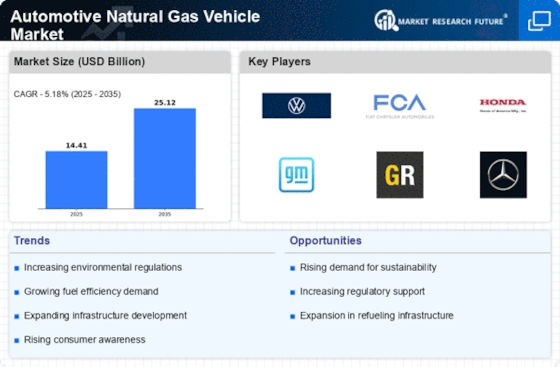Top Industry Leaders in the Automotive Natural Gas Vehicle Market
*Disclaimer: List of key companies in no particular order
The automotive natural gas vehicle (NGV) market is experiencing a steady surge in growth, propelled by factors such as escalating fuel costs, growing environmental consciousness, and government initiatives. Navigating this dynamic landscape necessitates a comprehensive understanding of the competitive environment. This analysis delves into the strategies, market share determinants, innovative trends, and the overall scenario for major players, including Dongfeng Motors, AB Volvo, Beiqi Foton, Shaanxi Auto, Daimler, CNH Industrial, Landi Renzo, and Westport.
Market Share Factors:
Various factors exert influence on market share within the NGV sector:
-
Vehicle Portfolio: Gaining a competitive edge involves offering a diverse range of NGV models spanning passenger cars, light and heavy-duty trucks, and buses, catering to diverse consumer segments. -
Geographical Presence: Strengthening market share involves establishing a robust presence in regions with well-established NGV infrastructure and supportive government policies, such as China, India, and South America. -
Technological Advancements: A commitment to research and development to enhance engine efficiency, extend refueling range, and reduce emissions is vital for attracting environmentally conscious consumers. -
Cost Competitiveness: Competitive pricing for NGVs and the provision of financing options to offset higher upfront costs compared to gasoline or diesel vehicles can drive adoption. -
After-Sales Network: Ensuring customer satisfaction and repeat business involves maintaining a robust network of service stations and trained technicians for NGV maintenance.
Key Companies:
Key players in the NGV market include:
- Dongfeng Motors Group Limited (China)
- AB Volvo (Sweden)
- Beiqi Foton Motors Group Limited (China)
- Shaanxi Automobile Group Limited (China)
- Daimler AG (Germany)
- CNH Industrial NV (The Netherlands)
- Landi Renzo (Italy)
- Westport (Canada)
Key Player Strategies:
Traditional automakers and commercial vehicle specialists employ distinct strategies:
-
Dongfeng Motors (China): Focuses on developing cost-effective NGV models for passenger cars and light trucks, leveraging government subsidies in China. -
AB Volvo (Sweden): Emphasizes heavy-duty trucks and buses, forming partnerships with fuel providers and infrastructure developers to create complete NGV ecosystems. -
Daimler AG (Germany): Invests heavily in hydrogen fuel cell technology while offering NGV options in markets like Latin America and Southeast Asia. -
Beiqi Foton Motors (China): Dominates the NGV truck market in China, particularly in light and medium-duty segments. -
Shaanxi Automobile Group (China): Known for heavy-duty NGV trucks, leveraging its strong presence in China's construction and mining sectors. -
CNH Industrial (Netherlands): Offers NGV engines and conversion kits for various vehicle types, collaborating with automakers and fleet operators. -
Landi Renzo (Italy): A leading manufacturer of NGV fueling systems and components, expanding its reach through partnerships and acquisitions. -
Westport (Canada): Develops advanced NGV engine technologies like high-pressure direct injection, enhancing efficiency and emission performance.
New and Emerging Trends:
Recent trends shaping the NGV market include:
-
Bio-NGV Adoption: Growing interest in renewable biogas as a fuel source, particularly in Europe and North America, is driving demand for bio-NGV compatible vehicles. -
Hydrogen Blending: Blending hydrogen with natural gas reduces emissions and extends range, creating a transition pathway towards pure hydrogen fuel cell vehicles. -
Fleet Electrification: While electric vehicles pose long-term competition, NGVs remain a viable option for fleet operators concerned about refueling infrastructure and range limitations for EVs.
Overall Competitive Scenario:
Intense competition characterizes the NGV market, with traditional automakers contending against specialized manufacturers and technology providers. Success hinges on strategic partnerships, technological advancements, and a focus on specific market segments. Regulatory factors and fuel infrastructure development play significant roles, but long-term growth relies on innovation, cost competitiveness, and addressing diverse consumer needs.
Automotive Natural Gas Vehicle Industry Developments:
Noteworthy industry developments include:
-
February 2021: Agility Fuel Solutions improved its standing among companies offering mobility solutions based on natural gas and renewable natural gas by merging with Hexagon Mobile Pipeline. -
September 2020: Westport Fuel Systems Inc. and its joint venture partner, UNO MINDA Group, reached a firm agreement, enabling the business to cater to the expanding Indian NGV market more effectively.

